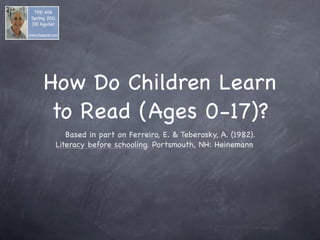
Reading development
- 1. TED 406 Spring 2011 Jill Aguilar www.jillaaguilar.com How Do Children Learn to Read (Ages 0-17)? Based in part on Ferreiro, E. & Teberosky, A. (1982). Literacy before schooling. Portsmouth, NH: Heinemann
- 2. Early Literacy Research Ferreiro & Teberosky, 1970s Argentina Set up a series of experiments to try to find out what 3-4 year-olds (low income, middle income) know about literacy. Experiments included book handling, determining what is something to be read and something to be looked at, guessing what an adult is reading, and other. TED 406 Spring 2011 Jill Aguilar www.jillaaguilar.com
- 3. For example... They asked, “Is this something to look at or something to read?” The Cat in the Hat is in the tree. TED 406 Spring 2011 Jill Aguilar www.jillaaguilar.com
- 4. For example... They asked, “Is this WWXL something to read?” MMMMMMM tttttttttt 12679 TED 406 Spring 2011 Jill Aguilar www.jillaaguilar.com
- 5. For example... They asked, “What does this say?” TED 406 Spring 2011 Jill Aguilar www.jillaaguilar.com
- 6. TED 406 Spring 2011 Jill Aguilar www.jillaaguilar.com
- 7. TED 406 Spring 2011 Jill Aguilar www.jillaaguilar.com
- 8. TED 406 Spring 2011 Jill Aguilar www.jillaaguilar.com
- 9. TED 406 Spring 2011 Jill Aguilar www.jillaaguilar.com
- 10. TED 406 Spring 2011 Jill Aguilar www.jillaaguilar.com
- 11. TED 406 Spring 2011 Jill Aguilar www.jillaaguilar.com
- 12. TED 406 Spring 2011 Jill Aguilar www.jillaaguilar.com
- 13. TED 406 Spring 2011 Jill Aguilar www.jillaaguilar.com
- 14. TED 406 Spring 2011 Jill Aguilar www.jillaaguilar.com
- 15. TED 406 Spring 2011 Jill Aguilar www.jillaaguilar.com
- 16. They found... That young children develop very complex ideas about reading and writing before they can do either... In fact, the theories that very young children can develop before schooling help them to read and write better and faster when they get to school... Children go through at least 4 recognizable phases... TED 406 Spring 2011 Jill Aguilar www.jillaaguilar.com
- 17. Pre-School Stages Global/Nonanalytic Name Hypothesis Syllabic Hypothesis Alphabetic Principle TED 406 Spring 2011 Jill Aguilar www.jillaaguilar.com
- 18. National Reading Panel The United States has been wracked by “The Reading Wars” since the early part of the twentieth century... Some folks think that the best way to learn to read is “the natural way”- if children are surrounded by books and readers, they will learn to read... Others claim that children need to learn the parts and steps to reading in order to experience success, so... TED 406 Spring 2011 Jill Aguilar www.jillaaguilar.com
- 19. National Reading Panel In 2000, the gum’mint set a panel to decide once and for all, which method is right. They were to answer the question, “What is the one best way to learn to read?” Guess what they found... TED 406 Spring 2011 Jill Aguilar www.jillaaguilar.com
- 20. National Reading Panel They are BOTH right... they NRP recommended a “Balanced Approach,” which includes parts of both methods... They also identified 5 essentials that all readers need in order to be successful readers... Phonemic awareness, Phonics, Fluency, Vocabulary, Comprehension TED 406 Spring 2011 Jill Aguilar www.jillaaguilar.com
- 21. Adolescent Literacy Most adolescents- unless they have identified learning or reading disabilities, do NOT need instruction in phonemic awareness or phonics Most adolescents DO need (much) more practice in order to increase Fluency, Vocabulary, & Comprehension TED 406 Spring 2011 Jill Aguilar www.jillaaguilar.com
- 22. Academic Literacy What constitutes academic literacy? The dispositions and habits of mind that enable students to enter the ongoing conversations appropriate to college thinking, reading, writing, and speaking are inter-related and multi-tiered. Students should be aware of the various logical, emotional, and personal appeals used in argument; additionally, they need skills enabling them to define, summarize, detail, explain, evaluate, compare/ contrast, and analyze. Students should also have a fundamental understanding of audience, tone, language usage, and rhetorical strategies to navigate appropriately in various disciplines. TED 406 Spring 2011 Jill Aguilar www.jillaaguilar.com
- 23. Reading to Learn Learning to Read 1 2 3 4 5 6 7 8 TED 406 Spring 2011 Jill Aguilar www.jillaaguilar.com
- 24. Academic Literacy Using Reading & Writing to Think 4 5 6 7 8 9 10 11 12 TED 406 Spring 2011 Jill Aguilar www.jillaaguilar.com
- 25. Academic Literacy 4 5 6 7 8 9 10 11 12 TED 406 Spring 2011 Jill Aguilar www.jillaaguilar.com
- 26. Academic Literacy 4 5 6 7 8 9 10 11 12 TED 406 Spring 2011 Jill Aguilar www.jillaaguilar.com
- 27. Academic Literacy 4 5 6 7 8 9 10 11 12 TED 406 Spring 2011 Jill Aguilar www.jillaaguilar.com
- 28. Every Teacher must do her or his part. TED 406 Spring 2011 Jill Aguilar www.jillaaguilar.com
Hinweis der Redaktion
- \n
- \n
- \n
- \n
- \n
- \n
- \n
- \n
- \n
- \n
- \n
- \n
- \n
- \n
- \n
- \n
- \n
- \n
- \n
- \n
- \n
- \n
- \n
- \n
- \n
- \n
- \n
- \n